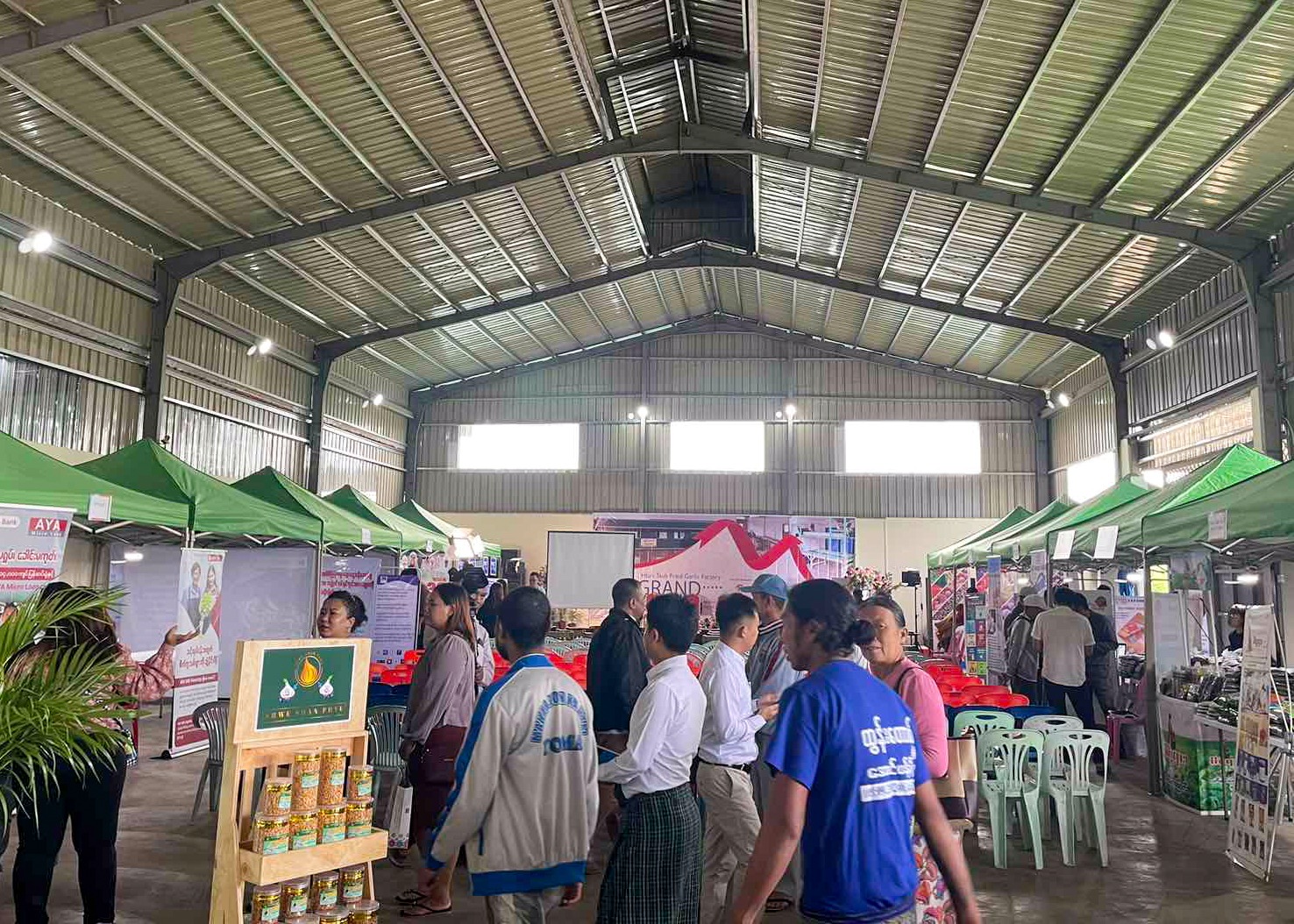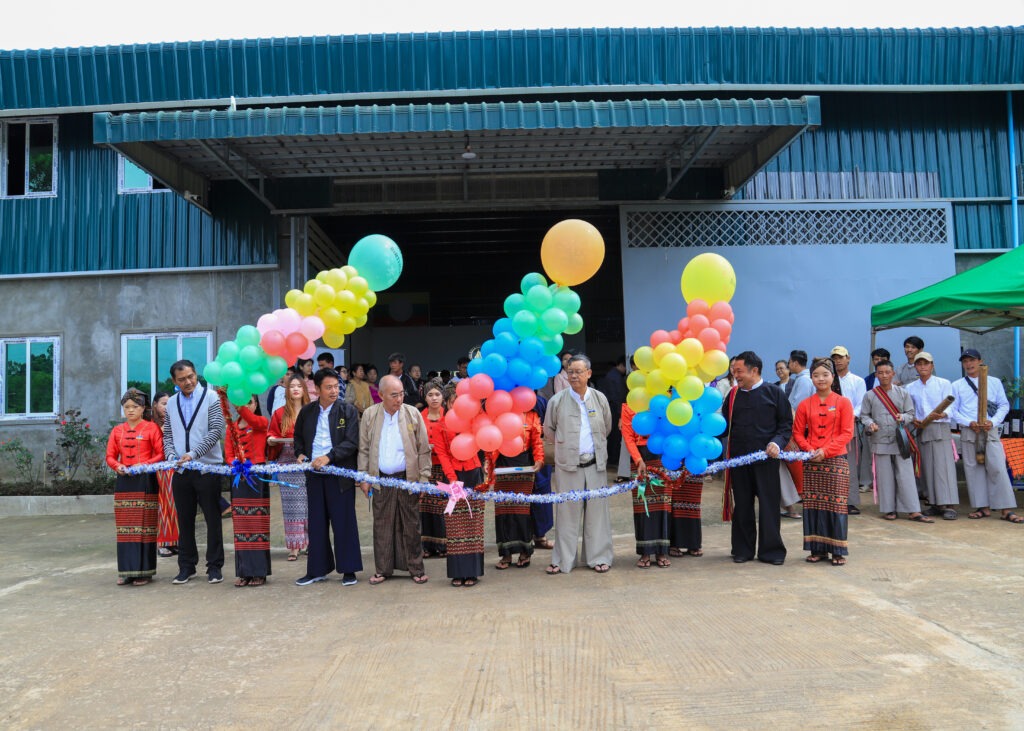
Myanmar’s agriculture sector continues to face serious impacts from the February 2021 military coup and ongoing civil conflict. Navigating these waters has been difficult. Farming input costs have skyrocketed, border trade has been disrupted by fighting and COVID-19, and shipping of imports and exports is no longer reliable. Government subsidies of farm credit have been largely suspended amidst a cash shortage resulting from the banking crisis. Most farmers have not been able to pay back their previous season loans, while the subsidy’s financial model offers no incentive for farmer compliance. Additionally, insecurity due to the conflict has made transportation, communication, and cooperation in the agricultural market system extremely fraught. Some agricultural businesses are coping by scaling down or pausing operations. All of this has led to fragile, thin markets.
How One Feed the Future Activity and its Partners Adapted
Considering these events, the Feed the Future Burma Agriculture and Food Systems Development Activity, which ACDI/VOCA and subawardee FHI 360 began implementing in 2019 under USAID support, was forced to change its approach. While the Activity’s partners had little choice but to adapt, the Activity also had little choice but to shift to a market systems resilience focus midway through the life of the project. A primary goal became enhancing cooperation across the agricultural market system. The Activity found success through a garlic factory in Aungban Township in the Southern Shan State. Below is a case study of how a single event related to this factory overcame uncertain times to benefit not only farmers, but also private sector companies, and financial institutions.
Cooperation with Government Officials
Because of current circumstances in Myanmar, the continued presence and monitoring by government officials inhibits agricultural market actors from gathering. For example, to hold a trade fair, local authorities must be present. As a donor, USAID has also updated its policies to avoid direct support of the current military-run government.
To overcome this barrier, the FHI 360 team worked with one of its trusted partners to host the opening of the Htun Tauk Company’s fried garlic factory. While the event was marketed as a celebration of this opening, the team worked with the company to simultaneously organize a large trade fair. This allowed a broad range of market actors to congregate under fewer restrictions.
The Garlic Factory Opening
A total of 340 farmers from 14 different ethnic backgrounds and 106 Activity partners engaged in the event, gaining insights into various inputs and services and establishing connections with potential new markets. Activity partners also had the opportunity to showcase their products and services with farmers and other agriculture and market system actors.

Impacts of the Event
Participants experienced positive impacts from the event almost immediately. Below are several examples of both potential and achieved impact:
- Increased access to inputs for Northern Shan State farmers
The Palaung Tea Grower and Seller Association, from Namhsam Township, established a connection with the Doe Pyi Thit Vermi Compost Fertilizer Company during an insightful learning visit organized by the Activity. They discussed sending their farmers to Doe Pyi Thit’s facility to learn how to make vermicompost natural fertilizer as part of their plan to start selling organic teas.
- Connection to the market for Southern Shan State farmers
Farmers from Pinlaung Township connected with Nan Htet Myanmar Company to discuss the crops they grow, such as oranges, tea leaves, avocados, and garlic, and invited officials to visit their villages to see for themselves. This connection to a new buyer could lead to more sales and better opportunities for the farmers.
- Increased garlic production and better livelihoods for garlic farmers
Garlic farmers from Tigyit and Taunggyi townships gained insights into the process of fried garlic production. Following the event, they were eager to increase their garlic cultivation, largely due to their newfound assurance about the market. This sense of security has significant potential to boost production, positively affecting their livelihoods. It also transformed their approach. Previously, they had to discard or sell lower-quality garlic at meager prices. With the Activity’s support, they learned how to sell not-so-perfect garlic for a reasonable price.
- Fertilizer partnership and garlic market access for corn farmers
Corn farmers from Sat Tay and Myay Mae villages, in Lawksawk Township, secured an easier way to buy fertilizer and a new buyer for their garlic. They discussed working as sales agents for Boardless Myanmar Bokashi Natural Fertilizer Company in their villages. This would make fertilizer more accessible in their villages, saving farmers time and money. Those who grow garlic after their corn crops also had the chance to connect with the company celebrating their factory opening, Htun Tauk, who agreed to buy their garlic.
- Better financial inclusion and income generation
In collaboration with FHI 360, the Kanbawza Bank (KBZ) Pay team offered ICT technical assistance to farmers and market actors opening KBZ Pay accounts. KBZ also delivered a presentation educating farmers about their services, such as digital payments. Twelve individuals registered to become mobile money agents, which will not only generate supplementary income for them, but also facilitate mobile transfers for farmers in their villages. FHI 360 introduced curriculum for digital financial literacy to Kachin Baptist Convention and Kachin Land College. They expressed interest in a Training of Trainers session for their staff and farmers, representing progress in the institutionalization of the Activity’s digital financial literacy curriculum.
- Empowering youth entrepreneurship
Three organizations serving young people in Kachin State—Kachinland College, Naushawng Institute, and the Kachin Baptist Convention’s Sustainable Development Learning Center (KBC -SDLC)— met with market actors from Shan State’s Mandalay and Magway regions. Kachinland College decided to plan a student excursion to study agribusiness in Southern Shan State with support from the Activity. Naushawng Institute and KBC-SDLC met with six market actors to launch internship programs. One youth entrepreneur who had a contract with Nan Htet Myanmar increased their sales by selling products at the Htun Tauk Company event. There, they met with AYA Bank to talk about financing. Another youth director from Kaung Ko Group discussed different businesses from Southern Shan State and exchanged experiences in the Kachin sesame sector with the Activity.
- Better connections to markets and increased sales after the event
At the event, Htun Tauk Company introduced their new fried garlic products and processing machines. This immediately captured the attention of potential buyers, resulting in sales amounting to over MMK 1,100,000 (USD 523) on the spot. In the month following the event, their sales of fried garlic products exceeded MMK 100,000,000 (USD 47,615). According to one company representative, this denoted a 30 percent increase in sales. With a renewed demand for garlic, many farmers can now worry less about the market.
What’s Next?
After such a success, Htun Tauk Company is interested in holding the event annually. Offers have already come in for sponsorship from large companies and financial institutions. The event reinforced the value connectivity can have during periods of insecurity and conflict within a market system. Global development programs, like the Feed the Future Burma Agriculture and Food Systems Development Activity, play an important role in sustaining market linkages, increasing social capital, and providing a platform for market actors to come up with their own locally-driven solutions to mitigate shocks.








